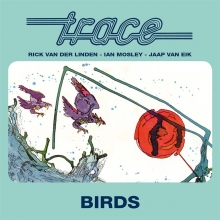MENNO VON BRUCKEN FOCK
BIRDS (1975), heruitgave, (E)

While Trace gained critical acclaim for their first eponymous album (1974), sales were rather disappointing and while plans to record the second album Birds were well on their way, Pierre van der Linden bowed out to join his previous band Focus again. A decision he regretted afterwards. So in the middle of the preparations Rick van der Linden and Jaap van Eik had to look for another drummer. He had to be exceptionally good because Pierre was, and still is, a world class drummer and eventually young talent Ian Mosley - currently still drumming in Marillion - was chosen. The trio recorded Birds, just like their debut, in the Soundpush Studio in Blaricum. The lengthy suite Birds emphasized Rick’s attempt and his ability to write a conceptual work. As with the debut album, the sound quality has been enhanced and the quality of the live album is way better than any bootleg. The trademark of Trace, the adaptation of classical pieces into a symphonic rock tune, is best demonstrated in the first track Bourrée, taken from Bach’s English Suite No 2 In A Minor. In the middle there’s a more fusion-like interlude with the monkey cries of roadie Coen Hoedeman. An up-tempo track called Snuff features Rick on the organ. The music sounds more like contemporary artists like Dutch band Solution. Third track is a jazzy piano-solo by Rick, which in my opinion doesn’t fit very well among all other pieces on the album just as well as Penny, a very nice piece of late night jazz-music by piano, bass and drums, and the ultra-short pieces of Dixieland music called Trixie-Dixie. On the contrary Opus 1065 is another fine example of how well rock and classical music go together. Rick’s adaptation of a part from the Concert For Harpsichord & Strings by J.S. Bach features the talents of Darryl Way (Curved Air) on the violin, just like Rick a classically trained musician. As stated by the band themselves the Birds–suite are a bunch of short pieces ‘glued together’. It opens with King-Bird, a church-organ then organ, bass, drums and Van Eik’s electric guitar playing a melody in the vein of Focus. Between the classical themes there are several up-tempo pieces. The use of the electric guitar, flute samples and even Van Eik’s vocals make the band sound more like an ‘ordinary’ rock group. The urge of creating music without boundaries make this track a true statement of the band’s diversity and ability to mix different styles without comparison. It also gives insight in Rick’s explorations of all the newly developed keyboards. As a bonus track there’s a single version of Birds featuring the part in which van Eik plays guitar as well as bass and wherein Trace sounds more like Solution or Focus rather than The Nice.
On CD2 there are nine previously unreleased live tracks. The first four are from a performance for the Swedish Radio in 1975 with Pierre van der Linden on drums, the other five tracks were recorded in Langelsheim (Germany). The first track is an excerpt from the Birds-suite with Van Eik playing the lead guitar. There also a somewhat bluesy interlude not recorded for the definitive version of Birds. The second track is a lengthy version of Tabu, a (jazz)-rock piece with a large portion of improvisation on organ and subsequently the synth by Van der Linden as well as a bass solo by Van Eik, accompanied by Pierre van der Linden. The ability of Pierre to ‘feel’ the other two musicians is extraordinary. In the next track Gaillarde from the debut album the superb craftsmanship of Rick van der Linden is demonstrated and as I stated before, in my opinion his name should be listed along with Keith Emerson and Rick Wakeman, the other keyboard wizards from that era. Lots of soloing and improvising by Rick on the organ and the synth. Not all the keyboards are equally perfectly in tune, as happened a lot in the early seventies. Just as on the studio record there’s a bass solo by Van Eik, though a different one than recorded as The lost Past. In King-Bird we hear the return of the first majestic theme featuring van Eik on the lead guitar. Another version of Gaillarde with Mosley on the drums sounds markedly different from the first live version. Slightly different sound of the organ, obviously a different drummer and the interlude sounds more like Deep Purple without Ritchie Blackmore. The music flows right into the next track Snuff. In this more up-tempo part there’s some tuning of the keyboards by Rick. Then, before the themes of Gaillarde return, there are some solos by Rick. In Birds the lead melody played by electric guitar is now firstly played by Rick on the synth before Van Eik plays it on the guitar. After a classical prelude on the organ there’s Peace Planet, an old claasic by Ekseption closing off this terrific live album by Trace.
The diversity in styles is maybe the slightly weaker point of the studio album, the suite itself however is magnificent and the live album is an absolute must for any fan of Trace, The Nice, Emerson, Lake & Palmer or Le Orme.